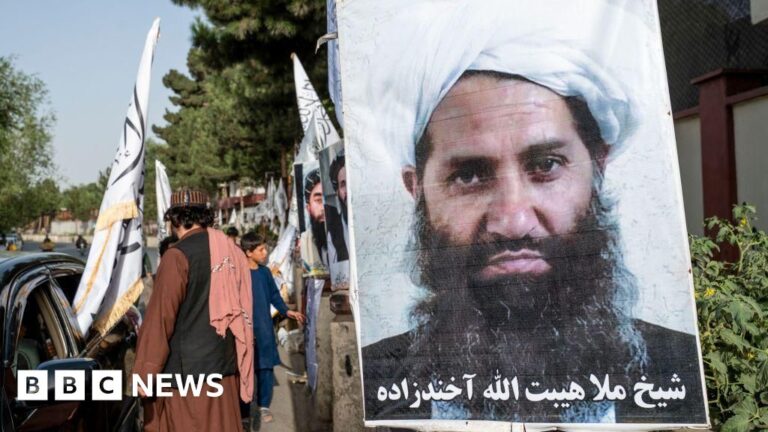The top prosecutor of the International Criminal Court (ICC) has said he will seek arrest warrants against senior leaders of the Taliban government in Afghanistan for the persecution of women and girls.
Karim Khan said there were reasonable grounds to suspect that Supreme Leader Haibatullah Akhundzada and Chief Justice Abdul Hakim Haqqani bore criminal responsibility for gender-based crimes against humanity.
ICC judges will now decide whether to issue an arrest warrant.
The ICC investigates and brings to justice those responsible for genocide, crimes against humanity and war crimes, intervening when national authorities are unable or unwilling to prosecute.
In a statement, Mr. Khan said the two men were “criminally responsible for the persecution of Afghan girls and women, as well as people whom the Taliban considered did not conform to their ideological expectations of identity or gender expression, and people the Taliban considered allies.” girls and women.”
Opposition to the Taliban government is “brutally repressed through the commission of crimes such as murder, imprisonment, torture, rape and other forms of sexual violence, enforced disappearances and other inhumane acts,” he said. he added.
The persecutions have been committed since at least August 15, 2021 until the present, across Afghanistan, the statement said.
Akhundzada became the Taliban’s supreme commander in 2016 and is now the leader of the so-called Islamic Emirate of Afghanistan. In the 1980s, he participated in Islamist groups fighting against the Soviet military campaign in Afghanistan.
Haqqani was a close associate of Taliban founder Mullah Omar and served as a negotiator on behalf of the Taliban during discussions with US representatives in 2020.
The Taliban government has not yet commented on the ICC statement.
The Taliban regained power in Afghanistan in 2021, 20 years after a US-led invasion toppled their regime following the September 11 attacks in New York, but their government has not been officially recognized by no other foreign power.
“Moral laws” have since caused women to lose dozens of rights in the country.
Afghanistan is today the only country in the world where women and girls do not have access to secondary and higher education: around one and a half million of them have been deliberately deprived of education.
The Taliban have repeatedly promised that they will be readmitted to the school once a number of issues are resolved, including ensuring that the school curriculum will be “Islamic.” This hasn’t happened yet.
Beauty salons have been closed and women are prohibited from entering public parks, gyms and baths.
A dress code means they must be fully covered, and strict rules forbid them from traveling without a male chaperone or looking a man in the eye, unless they are related by blood or marriage.
In December, women were also barred from training as midwives and nurses, closing their last route to further education in the country.

